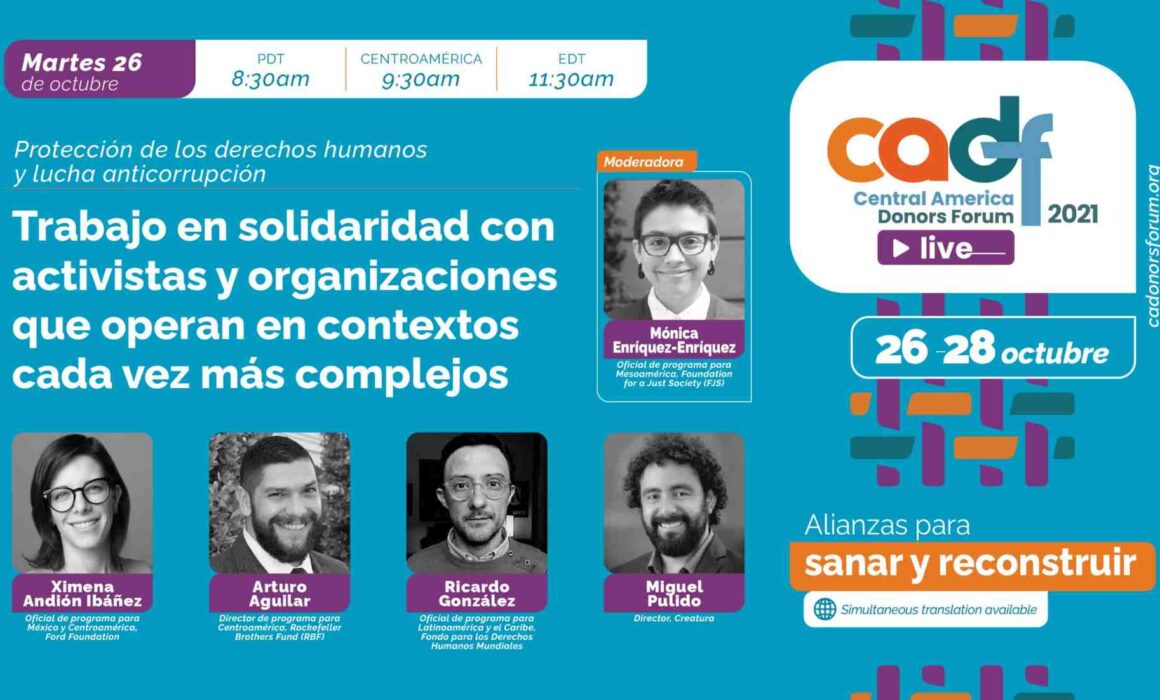Article written by EDGE member Clare Gibson Nangle , previously published on The Fund for Global Human Rights Website.
Latin America is one of the deadliest regions in the world for grassroots activists. Hundreds of human rights defenders were killed in 2020, often with impunity. In countries like El Salvador, Guatemala, and Honduras—where antidemocratic leaders and corrupt interests especially target environmental defenders—grassroots activists face unprecedented challenges and great personal risk.
Funders can help. Activists working under pressure-cooker conditions are unable to make progress when their physical and mental wellbeing are in jeopardy. When we mapped protection networks and mechanisms in Central America, it was clear: there is an urgent need for donors to increase their support for protection and psychosocial services.
That’s why a collective of leading donors—including the Fund—is proposing a new solidarity clause for human rights funding in Central America. We’re calling on other grant-makers to include financial support that addresses the urgent security needs of activists and organizations. In the face of democratic decline, it’s time for funders and donors to step up—not step back.
Although each country in Central America offers a unique set of challenges for funders, there’s a clear pattern across the region. Governments are weaking the electoral processes, undermining their own justice systems, and moving to silence opposition and dissent.
These conditions allow corruption and crime to flourish—two of the biggest threats to the work of human rights defenders. With insufficient state protection mechanisms in place and paralyzed—or outright hostile—justice systems, activists have few avenues for recourse.
> First, protection is paramount. Funders should be factoring safety and security into every grant they make. Our solidarity clause calls on all donors to include a cushion of funding for emergency security needs. This will ensure that activists have access to life-saving support in times of crisis.
To better understand the constellation of threats facing frontline activists, donors should also be conducting—and sharing—risk mapping, research, and analysis. Documenting the nature and extent of these security challenges is an essential step toward mitigating them.
> Second, funding models must reflect the difficult realities on the ground. That means adapting both the type of funding and method of delivery to ensure that grantees receive the support they need.
In this challenging environment, activists have to stay agile and responsive. Restrictive grants and short-term funding often have the opposite effect. Long-term, flexible, and participatory funding is the best way to demonstrate solidarity and commitment to community-driven solutions.
> Third, solidarity goes beyond security. Governments in the region are taking extraordinary legal and extrajudicial steps to put pressure on rights defenders, forcing Activists to seek safety in other towns, states, or even countries. But ensuring their survival is just the start. Cross-border protection networks offer displaced activists a way to reintegrate into society and, if they choose, to continue their vital efforts.
> Finally, solidarity between funders is just as important. When we lost two cherished colleagues in an automobile accident in Guatemala, we established a memorial fund in their name. Today, their legacies live on through the Ana Paula Hernández and Sally O’Neill Memorial Fund, which provides urgent support to Latin American human rights defenders who are at risk. If donors are unable to include a solidarity clause in their grant-making, we invite them to support the safety and security of their grantees by contributing to the Hernández O’Neill Memorial Fund.
This is a difficult moment for human rights in Central America. But the backlash also reflects the incredible progress that local civil society has already made. It’s imperative that we don’t lose sight of hope. As funders, we must use our financial capital and place of privilege to uphold our embattled frontline allies. Let’s begin by providing the resources and support they need to stay safe.
Originally published on The Fund for Global Human Rights.


Leave a Reply
You must be logged in to post a comment.